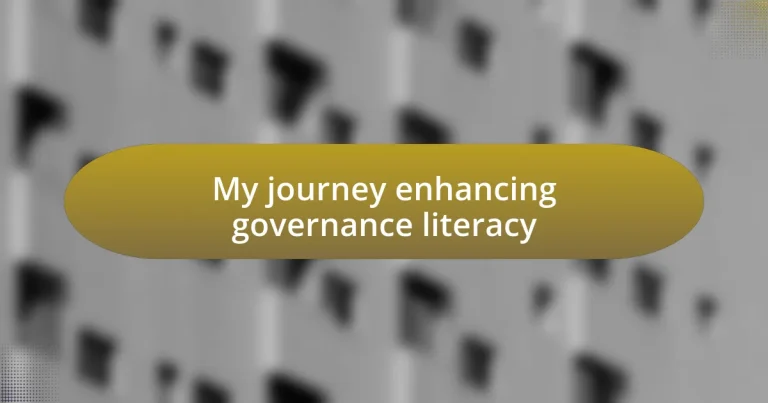Key takeaways:
- Governance literacy empowers individuals to influence decisions, hold leaders accountable, and actively participate in their communities.
- Key principles of effective governance include transparency, accountability, and inclusiveness, which foster trust and diverse representation.
- Continuous education, mentorship, and hands-on community involvement are essential strategies for enhancing governance skills.
- Assessing governance literacy progress through self-reflection and community engagement helps identify growth and deepen understanding.
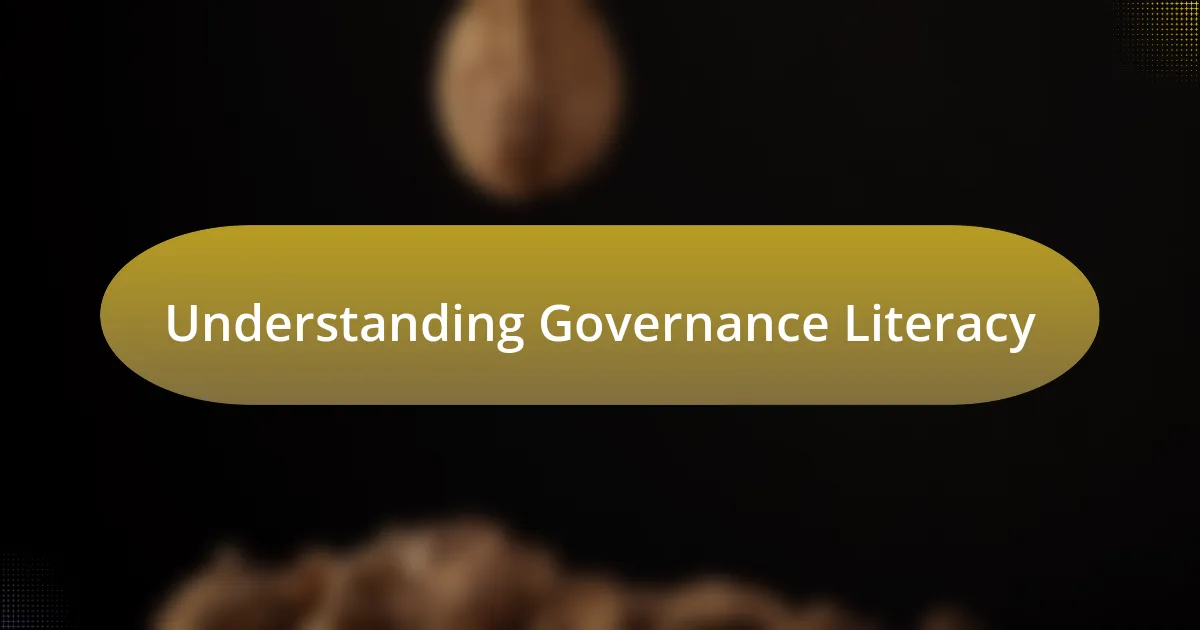
Understanding Governance Literacy
Governance literacy is really about understanding the systems and processes that guide how decisions are made in our communities and organizations. I remember when I first grasped this concept; it felt like flipping a switch in my mind. Suddenly, I could see the connections between policies, stakeholders, and the impact on everyday life.
This isn’t just an academic exercise; it’s deeply personal. Have you ever felt frustrated by a decision that seemed out of your control? I certainly have. Realizing that governance decisions shape our daily experiences prompted me to dive deeper into this subject. I started asking questions that others overlooked, and that curiosity empowered me to engage in discussions I never thought I could participate in.
Understanding governance literacy means recognizing our roles as informed citizens who can influence these processes. I’ve seen firsthand how small actions can lead to larger changes—like organizing a community meeting that transformed our neighborhood’s approach to local issues. It emphasizes that when we become literate in governance, we are not just passive observers but active participants shaping our shared future.
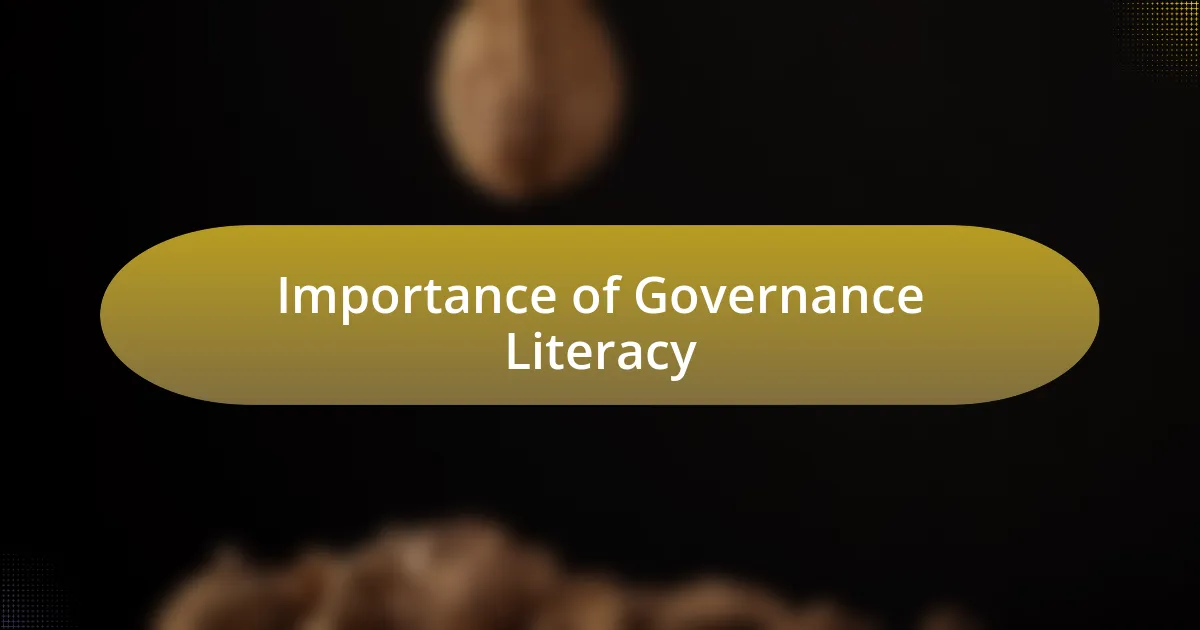
Importance of Governance Literacy
The importance of governance literacy cannot be overstated. It empowers individuals to understand and navigate the often complex landscape of decision-making, fostering meaningful participation in community matters. I remember attending a town hall meeting where many attendees seemed lost, unable to grasp the proposed budget changes. Their confusion illuminated how vital governance literacy is—not just for those in leadership but for every citizen. When people are informed, they can advocate effectively and hold leaders accountable for their actions.
Here are some key reasons why governance literacy is essential:
- Empowerment: Knowledge enables individuals to voice their opinions and influence policy decisions actively.
- Accountability: Informed citizens can better hold government officials and organizations responsible for their actions.
- Engagement: Understanding governance encourages participation in civic activities, making communities stronger.
- Transparency: A literate populace demands clarity and openness from leaders, fostering trust.
- Civic Duty: Being knowledgeable about governance is not just a right but a responsibility of every citizen.
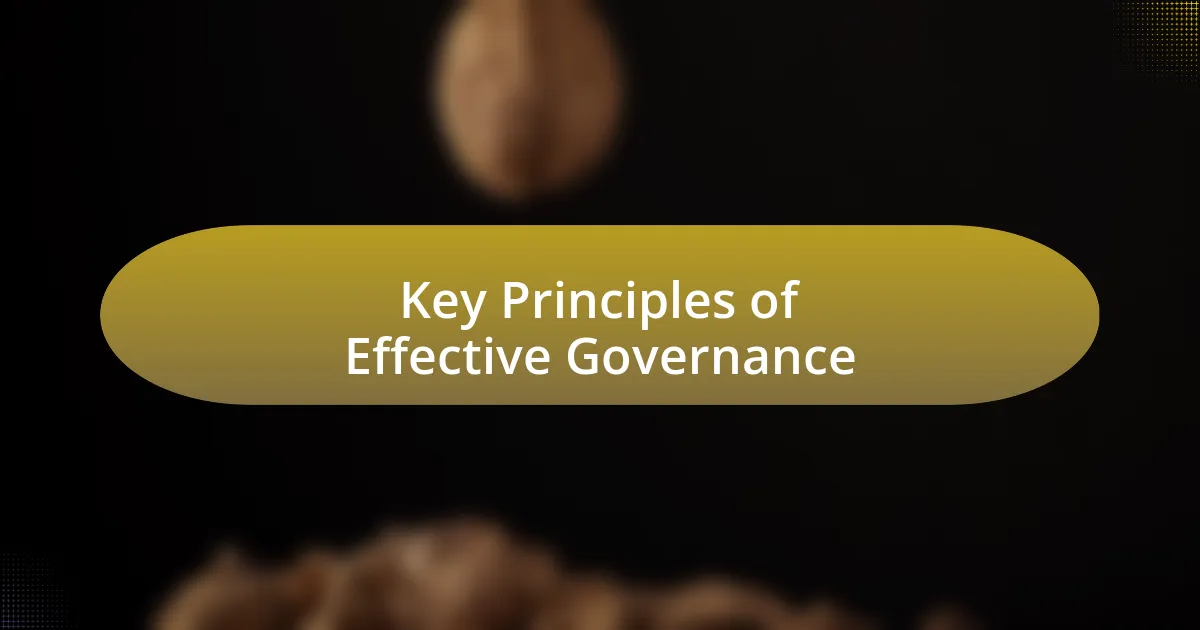
Key Principles of Effective Governance
Effective governance is built on several key principles that guide the actions of leaders and the engagement of citizens. One principle that stands out to me is transparency. I recall a situation where a local council planned a new park development. By openly sharing details about the budget and timelines, they not only built trust but also encouraged community feedback, making residents feel invested in the process.
Another essential principle is accountability. In my experience, I’ve observed that when leaders know they are answerable to the public, they’re more likely to make decisions that benefit the community. For instance, after a controversial budget allocation was revealed, the council members faced an outcry from the public. This led to a roundtable discussion where citizens had a chance to voice their concerns, demonstrating how accountability can foster a healthier dialogue between leaders and the community.
Lastly, inclusiveness cannot be overlooked. It’s crucial that governance incorporates diverse voices, ensuring that all community members see their perspectives represented. I once participated in a community forum where marginalized groups shared their experiences. This rich dialogue not only enlightened many participants but also highlighted the need for policies that consider all facets of society. Such inclusiveness strengthens the fabric of governance, making it more representative and effective.
| Principle | Description |
|---|---|
| Transparency | Openness in decision-making fosters trust and encourages civic participation. |
| Accountability | Leaders are answerable to the public, driving responsible decision-making. |
| Inclusiveness | Engaging diverse voices ensures representation and relevance in governance. |

Strategies to Enhance Governance Skills
To enhance governance skills, I believe ongoing education is essential. I remember attending a workshop where experts discussed the nuances of ethical decision-making in governance. It was eye-opening to realize how continuous learning not only sharpens skills but also instills confidence in making informed choices. How often do we reflect on our own understanding of ethics in leadership? Engaging with new ideas can truly transform our perspective.
Mentorship also plays a crucial role. I once had a mentor who was a seasoned public official, and through our conversations, I gained invaluable insights into the complexities of governance. The guidance I received helped me navigate challenging situations, reinforcing the importance of having experienced voices to turn to. Isn’t it inspiring how a single relationship can ignite one’s growth?
Lastly, participating in community projects offers practical experience that enhances governance skills. I volunteered for a local initiative aimed at improving public transportation. Through teamwork and real-world problem-solving, I grasped the intricacies of community needs and governance dynamics. When was the last time you engaged directly in a project that mattered to your community? These hands-on experiences not only build skills but also connect us more deeply with the people we serve.
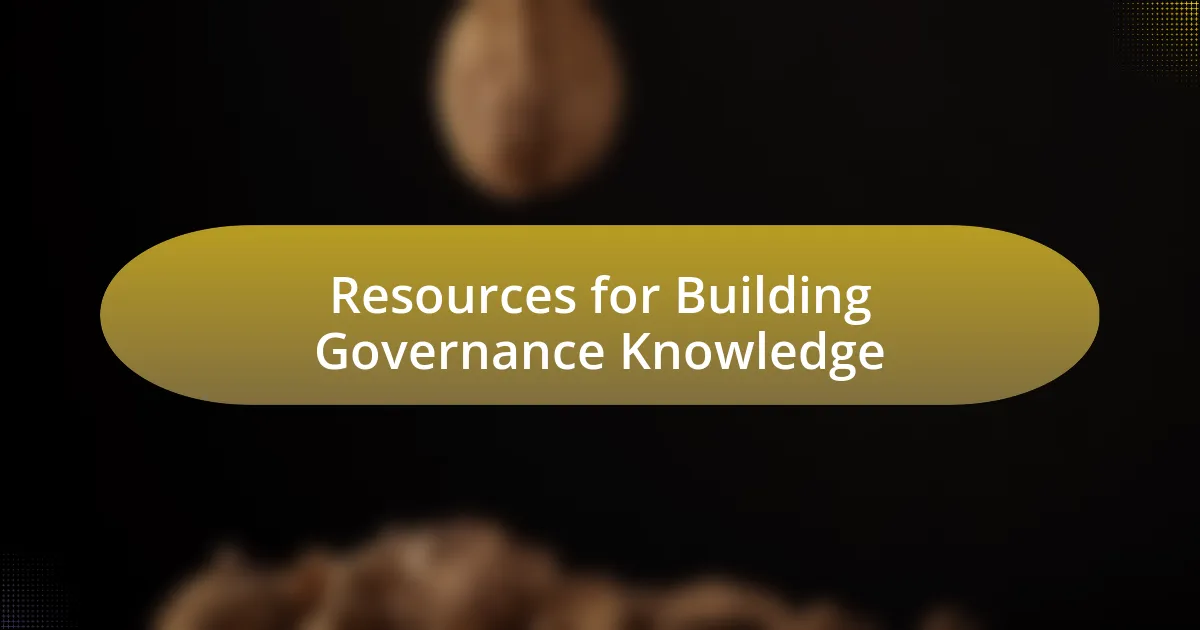
Resources for Building Governance Knowledge
Resources for enhancing governance knowledge can take many forms, and I often find that online platforms, such as specialized webinars or MOOCs (Massive Open Online Courses), are incredibly beneficial. I vividly remember taking a course on public policy that not only deepened my understanding of governance frameworks but also connected me with peers from diverse backgrounds. How often do we overlook the wealth of knowledge available at our fingertips?
Books can also serve as powerful tools in this journey. I recently immersed myself in a comprehensive guide on organizational governance, which opened my eyes to new governance models that challenge traditional approaches. Has there ever been a book that completely shifted your perspective on a topic? For me, this resource was a game changer, sparking discussions with colleagues who had differing views and enriching our collaborative efforts.
In addition to formal resources, community discussions—whether at town hall meetings or local forums—offer real-time insights and serve as a platform for knowledge exchange. I recall attending a town hall where residents expressed their concerns over local policy changes, and hearing their voices reminded me of the interconnectedness of governance and community engagement. How valuable is it to listen to those who are directly impacted by our decisions? Engaging in such dialogues can deepen our understanding and reinforce our commitment to effective governance.
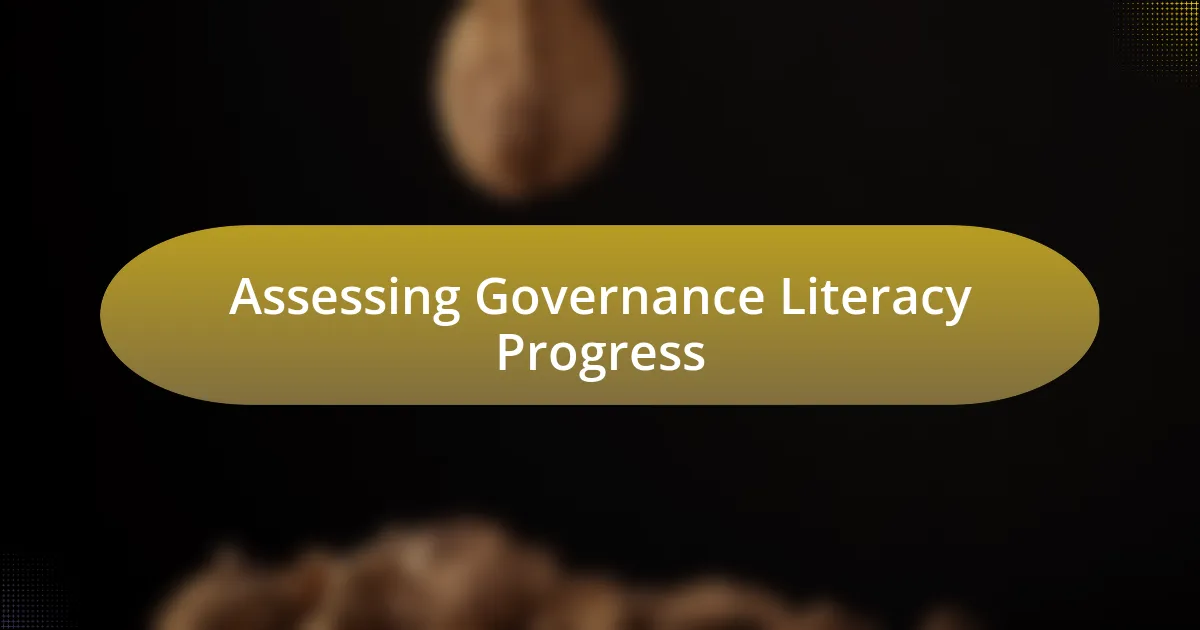
Assessing Governance Literacy Progress
As I assess my governance literacy progress, I often reflect on the milestones achieved along the way. Tracking my comprehension through self-assessments or reflective journaling has provided valuable insights into the gap between my current understanding and where I aspire to be. Has anyone else felt that moment of clarity when connecting theoretical knowledge with practical application? Those “aha” moments are what truly mark progress in this journey.
Engaging with communities can provide a unique perspective on governance literacy. I remember joining a local advocacy group, where we dissected government policies affecting our neighborhood. Through lively debates and discussions, I gained perspectives that enhanced my understanding of governance dynamics. How do we measure the impact of such experiences? I believe they serve as crucial benchmarks of growth, reminding us that progress isn’t solely quantitative.
Furthermore, I find that participating in governance workshops helps me gauge my evolution in understanding complex issues. One workshop I attended encouraged participants to simulate government decision-making processes. This immersive experience pushed me out of my comfort zone and challenged my preconceived notions. Isn’t it fascinating to see how practical experiences can reveal layers of comprehension previously hidden? These moments are essential indicators of how far we’ve come in our governance literacy journey.
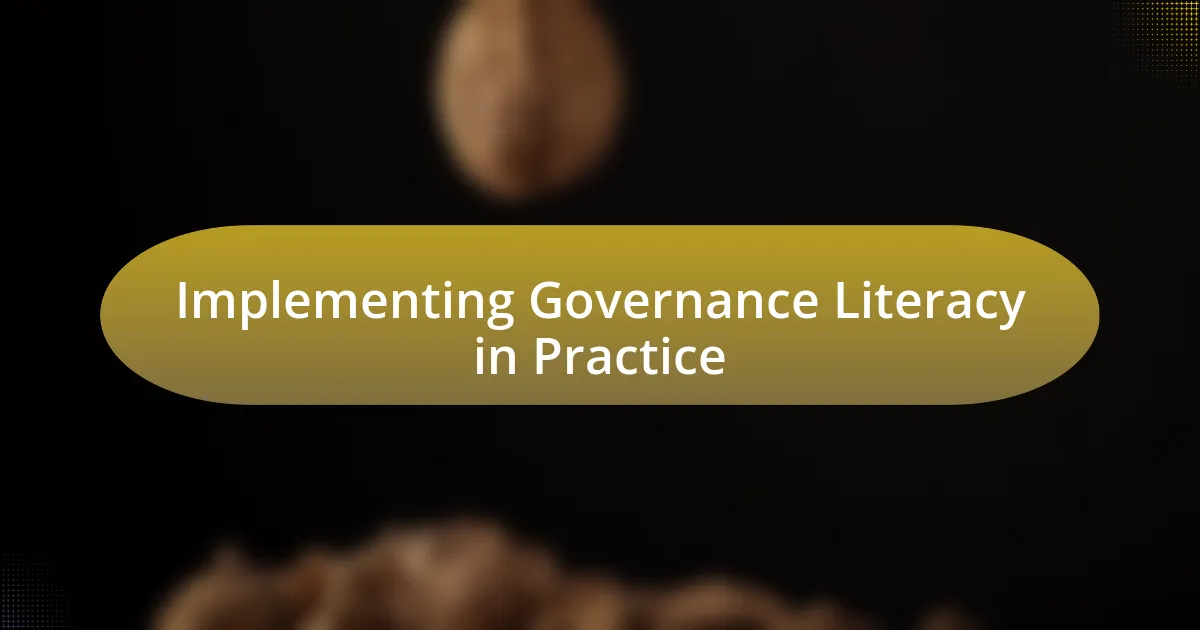
Implementing Governance Literacy in Practice
Implementing governance literacy in practice requires a hands-on approach that connects theoretical frameworks with real-world scenarios. In one instance, I volunteered for a community project that involved revising local zoning laws. This experience opened my eyes to the intricacies of governance and how seemingly small changes can significantly impact people’s lives. Have you ever felt the weight of such responsibility in decision-making?
Another practical step I’ve embraced is collaborating with peers to create educational initiatives. I remember organizing a series of workshops aimed at demystifying governance processes for my local community. The energy in those sessions was palpable, and witnessing participants’ enthusiasm as they grasped complex concepts reaffirmed my belief in collective learning. Isn’t it rewarding to facilitate learning in others while enhancing our own literacy?
Furthermore, I find that engaging with digital platforms can significantly boost one’s governance literacy. For example, I often participate in webinars and online forums where experts dissect current governance issues. The exchange of ideas in these virtual spaces energizes my understanding and challenges my viewpoints. Have you explored how technology can connect you with global discussions on governance? It’s a fascinating resource that can bring fresh insights directly into our local contexts.

